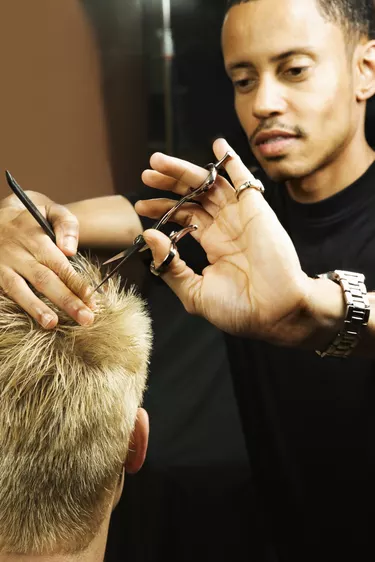
Hair stylists work in many different types of employment situations. Some stylists are employed by salons. Others are considered self-employed contractors who rent space in a salon. Still others may own a salon, renting space to other stylists. Your type of employment situation affects the expenses you'll incur as a hair stylist, and determine what you can deduct on your taxes.
Equipment and Supplies
Video of the Day
The tools you use to style hair are tax-deductible expenses. Things like hair dryers, curling irons, straightening irons, stationary hair dryers, razors, scissors, clippers and combs are all tax deductible, because they're normal equipment that hair stylists use throughout the course of their jobs. You can also deduct supplies like shampoo, conditioner and styling products. However, you can only deduct equipment and supplies that you've purchased. Equipment and supplies provided by the salon or manufacturer for your use are not tax deductible, because you didn't purchase them.
Video of the Day
The Salon Space
If you own the salon, the money you spend for salon supplies and the salon space itself can be tax deductible. Furniture and fittings for the salon, such as chairs, stools, furniture in the waiting area, mirrors and other normal expenses are tax deductible. Likewise, if you rent or own the space, it's tax deductible. If the salon space is a part of your home, you may be able to deduct a portion of your home's utility expenses and rent or mortgage payment. Finally, any supplies for the salon, such as highlighting foil, processing caps, towels and robes are deductible.
Uniforms
If you are required to wear a specific uniform for your hair stylist job, the cost of the uniform itself, as well as maintenance for the uniform, is tax deductible. You can deduct the initial cost of the uniform. You can also deduct dry cleaning costs, repair costs or other costs associated with maintaining your uniform. Employees deduct this on the Schedule A, while self-employed hair stylists can deduct these costs as a business expense.
Insurance and Advertising
Some of the costs associated with running the business, such as insurance and advertising, are deductible. If you're self-employed, you can deduct the cost of health insurance. If you're an employee, you can deduct premiums that are over 7.5 percent of your gross income. Self-employed and salon owner hair stylists can also deduct the cost of advertising. Creating a salon website, radio and newspaper ads, flyers and business cards and other advertising are tax-deductible expenses.
Continuing Education
Hair stylists who undergo continuing education can deduct the expense on their taxes, as long as they pay for it. If you're an employee hair stylist and your job pays for the continuing education, you can't deduct it. However, if you're self-employed, you can deduct continuing education expenses. Things like additional classes for hair color, conferences for hair stylists or any continuing education and recertification expenses are tax deductible. Also, if you have to go out of town for continuing education, you can deduct travel, food and lodging expenses.
General Rules for Business Deductions
The IRS says that to deduct business expenses on taxes, the "expense must be both ordinary and necessary." Based on IRS tax deduction rules, expenses that are abnormal for a hair stylist are not tax deductible. Likewise, expenses that are unnecessary don't qualify as tax deductible. Keep this rule in mind when determining tax deductions, and consult a CPA or tax professional if you're not certain about whether an expense is tax-deductible.